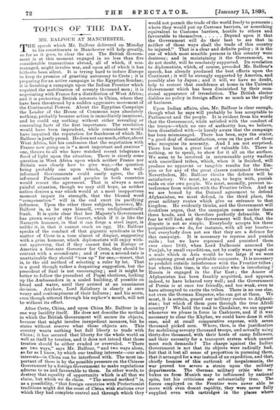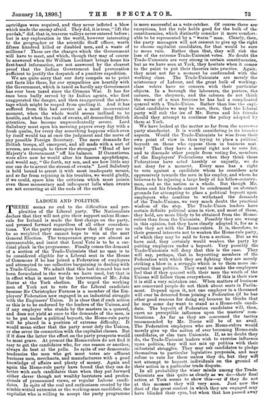TOPICS OF THE DAY.
MR. BALFOUR AT MANCHESTER. THE speech which Mr. Balfour delivered on Monday to his constituents in Manchester will help greatly, so far as it goes, to clear the air. The British Govern- ment is at this moment engaged in no less than five considerable transactions abroad, all of which, if mis- managed, might involve war, and upon all of which it has hitherto been silent. It is trying hard to induce Europe to keep its promise of granting autonomy to Crete ; it is preparing for an active campaign in the Egyptian Soudan; it is finishing a campaign upon the Indian Frontier which required the mobilisation of seventy thousand men ; it is negotiating with France for a distribution of West Africa; and it is protecting British interests in China, where they have been threatened by a sudden aggressive movement of the Continental Powers. About the Egyptian Campaign the Leader of the House of Commons says absolutely nothing, probably because action is immediately imminent, and he could say nothing without either revealing or concealing facts of the first importance. The revelation would have been imprudent, while concealment would have impaired the reputation for frankness of which Mr. Balfour is justly proud. He does not say much, either, about West Africa, but his confession that the negotiation with France now going on is "a most important and anxious" one, throws to all who have watched recent telegrams a flood of light upon the situation. There is clearly some question in West Africa upon which neither France nor Britain sees clearly how to give way,—the question being probably one upon which, though the well- informed Governments could easily agree, the ill- informed Parliaments and peoples in both countries would resent the agreement. That is always a most painful situation, though we may still hope, as neither nation desires a war which would at a most inopportune moment impair its strength, that the blessed word " compensation " will in the end exert its pacifying influence. Upon the other three subjects, however, Mr. Balfour is, as he says himself, even undiplomatically frank. It is quite clear that her Majesty's Government has grown weary of the Concert, which if it is like the Nasruyth hammer, in that it can forge a steel ingot, is unlike it, in that it cannot crack an egg. Mr. Balfour speaks of the conduct of that gigantic syndicate in the matter of Crete in a tone almost of disgust, suggesting with a grim humour, which diplomatists will enjoy with- out approving, that if they cannot find in Europe or America a first-rate Governor for Crete, they should be content -with a second-rate ; and if even a second-rate is unattainable they should " toss up" for one,—resort, that is, to the old method of selecting a ruler by lot. That is a good though rather a despairing suggestion, but the precedent of Saul is not encouraging ; and it might be better to follow the precedent of Papal elections, locking up the Ambassadors in a sealed building, if possible on bread and water, until they arrived at an unanimous decision. Anyhow, Lord Salisbury is clearly at once weary and contemptuous of their failures ; and his scorn, even though uttered through his nephew's mouth, will not be without its effect.
After Crete, China, and upon China Mr. Balfour is in one way lucidity itself. He does not describe the method in which the British Government will secure its objects, because that might involve inexpedient menaces, but he states without reserve what those objects are. This country wants nothing but full liberty to trade with China; it has secured that liberty for the whole world as well as itself by treaties, and it does not intend that those treaties should be either evaded or overruled. "There are two ways," says Mr. Balfour, "and two ways alone, o far as I know, by which our trading interests—our sole interests—in China can be interfered with. The most im- portant of these is by the possible pressure on the Chinese Government by a foreign Government to make regulations adverse to us and favourable to them. In other words, to destroy that equality of opportunity which is all that we claim, but which we do claim. "The second method" is, as apossibility, "that foreign countries with Protectionist traditions might dot the coast of China with stations over which they had complete control and through which they would not permit the trade of the world freely to permeate ; where they would put up Customs barriers, or something equivalent to Customs barriers, hostile to others and favourable to themselves Depend upon it that the Government will do their best to see that in neither of those ways shall the trade of this country be injured." That is a clear and definite policy ; it is the one of which most sensible persons in this country were desirous ; and in maintaining it the Government, we do not doubt, will be resolutely supported. Its revelation to diplomatists, which, of course, preceded Mr. Balfour's speech, has already produced the best effects upon the ; it will be strongly supported by America, and possibly also by Japan ; and it will, we have no doubt, help to restore that confidence at home in the Unionist Government which has been diminished by their occa- sional appearance of irresolution. The British elector dislikes no policy in foreign affairs so much as the policy of haziness.
Upon Indian affairs, also, Mr. Balfour is clear enough,. though what he says will probably be less acceptable to Parliament and the people. It is evident from his words that the Government, while satisfied with the conduct of the troops—which no one of authority has, we believe, been dissatisfied with—is keenly aware that the campaign has been mismanaged. There has been, says the orator, "a good deal of dissatisfaction, even on the part of those who recognise its necessity. And I am not surprised. There has been a great loss of valuable life. There is nothing, so to speak, to show for it all on the surface. We seem to be involved in interminable petty warfare with uncivilised tribes, which, when it is finished, will produce no apparent or tangible results for the Em- pire or for any of the great classes contained therein." Nevertheless, Mr. Balfour thinks the defence will be satisfactory. We must, he says, to begin with, punish raids on our own people. We must, secondly, prevent in- terference from without with the Frontier tribes. And as we are bound by the Durand agreement to defend Afghanistan, we must defend, in the third place, the great military routes which give us entrance to that kingdom. He evidently thinks, and the Government will doubtless argue, that the campaign comes under these three heads, and is therefore perfectly defensible. We fear he will find, and the Government will find, that the dispute is not so simple. Everybody accepts his three propositions—we do, for instance, with all our hearts— but everybody does not see that they are a defence for this campaign. It is necessary to repress and punish raids ; but we have repressed and punished them ever since 1849, when Lord Dalhousie annexed the Punjab, by small expeditions, not by costly wars waged on a scale which in Asia would be too large if we were attempting great and profitable conquests. It is necessary to prohibit outside interference with the Frontier tribes ; but where, this time, is the outsider who is interfering ? Russia is engaged in the Far East ; the Ameer of Afghanistan has been frankly acquitted, and appears, indeed, to have behaved very well; and the Government of Persia is at once too friendly, and too weak, even to have attempted to excite the tribes. There is no one else, not even the German Emperor, who can get at them. We must, it is certain, guard our military routes to Afghani- stan; but which of them goes through the true Afridi country ? We hold the road to Candahar, we can appear whenever we please in force in Cashmere, and if it was necessary to clear the Khyber, we could have done it with ease, and at small comparative expense, with seven thousand picked men. Where, then, is the justification for mobilising seventy thousand troops, and actually using thirty-five thousand, with their hosts of camp followers, and their necessity for a transport system which cannot meet such demands ? The charge against the Indian Government is not that its objects were radically bad, but that it lost all sense of proportion in pursuing them,. that it arranged for a war instead of an expedition, and that, chiefly because of this outbreak of megalomania, the war proved too severe a strain upon the military departments. The German military critic who re- bukes us from Munich may be influenced by national spite, but his criticisms are substantially true. The forces employed on the Frontier were never able to move with even decent rapidity, they were never fully supplied even with cartridges in the places where cartridges were required, and they never inflcted a blow which made the enemy afraid. They did, it is true, "lift the purdah," did, that is, traverse valleys never entered before ; but is any exploration in the world, however interesting to the geographer or the scientific Staff officer, worth fifteen hundred killed or disabled men, and a waste of millions ? These are the charges which the Government will have to meet, and which, though they may of course be answered when Sir William Lockhart brings home his first-hand information, are not answered by the clearest proof that the Indian Government had provocation sufficient to justify the despatch of a punitive expedition. We are quite sorry that our duty compels us to point out facts like these, for our sympathies are heartily with the Government, which is taxed as hardly any Government has ever been taxed since the Crimean War. It has for once been badly served by its Indian agents, who first exaggerated the danger, and then exaggerated the advan- tage which might be reaped from quelling it. And it has suffered from this bad service at a most inconvenient moment, when the whole world seems inclined to be hostile, and when the rush of events, all demanding British attention, has become unprecedentedly severe. Lord Salisbury must open his morning papers every day with a fresh qualm, for every day something happens which even by itself would tax at once the judgment and the nerve of any possible Foreign Secretary. The mere demands for British troops, all emergent, and all made with a sort of scream, are enough to throw the strongest "Head of her Majesty's Government" off his balance. If Oxenstierna were alive now he would alter his famous apophthegm, and would say, "Go forth, my son, and see how little any one can do to arrest the stream of events." Lord Salisbury is held bound to arrest it with most inadequate means, and so far from rejoicing in his troubles, we would gladly, if we could, spare him the criticism which must poison even those momentary and infrequent lulls when events are not occurring at all the ends of the earth.



































 Previous page
Previous page